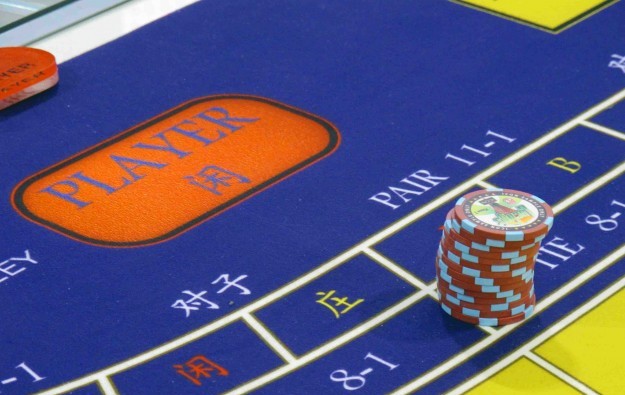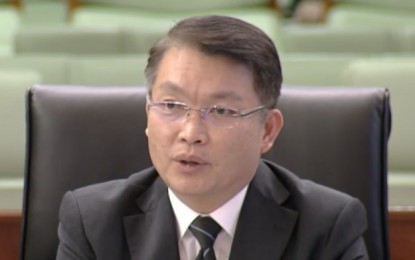Sands China tells junkets no more proxy betting: source
Oct 29, 2014 Newsdesk Latest News, Macau, Top of the deck

Sands China Ltd has contacted its junket partners in Macau casino operations to inform them that proxy betting – i.e., bets placed via telephone from gamblers not physically present on the property – will no longer be accepted, GGRAsia has learned from an industry source.
Another source – one close to the company – on Tuesday confirmed the move to GGRAsia, adding such action had been taken “very recently”.
“Your information is accurate,” said the person, adding “…it’s a continuation of Las Vegas Sands [Corp] and Sands China expanding their leadership role on compliance-related matters in general.”
The person declined to say whether a particular jurisdiction had asked Las Vegas Sands or Sands China to take such a step.
Ron Reese, vice president of public relations for the parent firm, declined to provide a comment when approached by GGRAsia.
What financial impact a prohibition on proxy betting could have on Sands China’s gaming business is unclear.
The size of the proxy betting market in Macau casinos is disputed. A conference session during Global Gaming Expo (G2E) Asia, held in Macau in May, heard it could be as much as 10 percent of the Macau VIP gambling market. High roller baccarat was worth MOP238.52 billion (US$29.9 billion) in gross revenue terms in 2013. Other industry sources suggest the 10 percent estimate is greatly overstated.
It has been reported however that Macau junkets have been willing to facilitate proxy betting provided the player or players roll at least HKD3 million (US$386,717) per session. It normally involves junket representatives sitting at a VIP table dedicated to the task taking instructions by phone from the gambler or gamblers.
The local regulator, the Gaming Inspection and Coordination Bureau (DICJ), doesn’t publish a breakdown of such activity in its casino revenue data.
GGRAsia understands there is no statute or regulation in Macau prohibiting a junket representative physically present in a casino placing a bet with properly authorised chips on behalf of another person communicating by telephone.
A third industry source however has told GGRAsia that proxy betting is of limited appeal in Macau. The person said that is because the local regulator does not allow the action at the city’s casino gaming tables to be video recorded and then streamed online. Without such safeguards, many Chinese players are worried that they would be defrauded of their rightful winnings, added the person.
Common practice
Jack Lam Yin Lok, chairman of Macau junket firm Jimei Group Ltd, has made a good business for many years by taking telephone bets from Chinese gamblers watching table games streamed live from a casino property he operates in the Philippines.
Proxy betting could have fresh appeal to mainland Chinese players that are already customers of Macau junkets but that prefer not to be seen in Macau following the anti-corruption crackdown on the mainland.
Sheldon Adelson, chairman of Las Vegas Sands, said during G2E in Las Vegas in early October that many Chinese players currently wanted to “stay below the radar”, though he added things would probably improve within a few months.
VIP gambling revenue declined 19 percent year-on-year in the third quarter according to DICJ. VIP play was only 56 percent of all casino game revenue in Macau in the period, the bureau added. A note from Union Gaming Research Macau Ltd described the result as “the lowest VIP mix – by a wide margin – since the liberalisation of gaming in Macau.”
Las Vegas Sands has previously taken a range of steps regarding its Las Vegas, Singapore and Macau operations in order to ensure it strengthened its compliance with U.S. statutes including the Foreign Corrupt Practices Act and the Bank Secrecy Act.
In January 2013 it was reported that Las Vegas Sands had stopped executing money transfers between its Macau casinos on behalf of high roller customers, and from its Macau properties to its Las Vegas properties.
The news came shortly after the parent firm confirmed it had hired three former agents from the Federal Bureau of Investigation in the U.S. to strengthen anti-money-laundering efforts and improve the background checks the company does on VIP customers and junket operators.
Las Vegas Sands and Sands China have also banned so-called “no name” accounts where a person who is not a casino employee deposits money at the casino cage on behalf of another person.
In August 2013, Las Vegas Sands confirmed it would pay US$47.4 million to the U.S. federal government to end a federal probe regarding failure to report a high roller’s allegedly suspicious cash deposits in Nevada. As part of the settlement, the firm was told it would not face prosecution action over the matter.
The U.S. Bank Secrecy Act requires casinos with gross annual revenue “in excess” of US$1 million to file suspicious activity reports. They can be analysed by government agencies.
Related articles
-
 SJM only Macau op with 3Q share, GGR...
SJM only Macau op with 3Q share, GGR...Nov 15, 2024
-
 Sands China’s leverage to continue...
Sands China’s leverage to continue...Oct 29, 2024
More news
-
 Macau to get 36mln visitors in 2025:...
Macau to get 36mln visitors in 2025:...Nov 21, 2024
-
 EBITDA a focus in Macau market share...
EBITDA a focus in Macau market share...Nov 21, 2024
Latest News
Nov 21, 2024
Macau’s 2025 visitor tally could reach 36 million, or a circa 9-percent gain on this year’s projected 33 million. So said Lei Wai Nong (pictured in a file photo), the city’s Secretary for...Sign up to our FREE Newsletter
 (Click here for more)
(Click here for more)
Pick of the Day
”[Baccarat side bets in Macau] are becoming more popular amongst players, based on what we observed when we conducted our [monthly premium mass] table surveys”
George Choi and Timothy Chau
Analysts at Citigroup
Most Popular
 Gaming technology firm IGT reports hacking incident November 21, 2024
Gaming technology firm IGT reports hacking incident November 21, 2024  US$30bln 2025 GGR target achievable for Macau: CE November 19, 2024
US$30bln 2025 GGR target achievable for Macau: CE November 19, 2024  Marina Bay Sands projects 40pct EBITDA leap post extension November 20, 2024
Marina Bay Sands projects 40pct EBITDA leap post extension November 20, 2024  Macau big-event outdoor venue gets trial run Dec 28: CE November 20, 2024
Macau big-event outdoor venue gets trial run Dec 28: CE November 20, 2024  Future of gaming is the online format: Pagcor chairman November 20, 2024
Future of gaming is the online format: Pagcor chairman November 20, 2024









